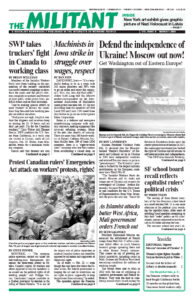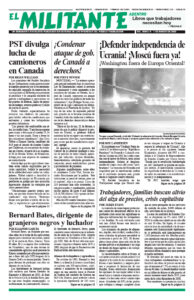The three men convicted in November of killing Ahmaud Arbery and sentenced in a Georgia state courtroom to life in prison were prosecuted again for the very same crime, this time in federal court, in the same city. The constitutional right not to be tried twice for the same crime is being tossed aside by the federal government. They are using the well-founded outrage over the murder to extend the power of the U.S. criminal “justice” system, a system that already ensnares millions of working people, disproportionately Black.
Arbery was chased and gunned down in Brunswick, Georgia, by Travis McMichael, while his father, Gregory McMichael, a retired police investigator, covered him with a gun. A neighbor, William Bryan, used his truck to trap Arbery during the assault.
All three were found guilty by unanimous verdict. Travis McMichael was convicted on all nine counts, including malice murder, meaning he deliberately intended to kill Arbery. All three were convicted of aggravated assault, false imprisonment and attempt to falsely imprison. Gregory McMichael and William Bryan were found guilty of felony murder, which is when a group of people commits a felony where someone is killed, even if they weren’t responsible. They were sentenced to life behind bars, with only Bryan given any possibility of parole.
The Justice Department filed federal hate-crime charges, and after the state convictions secured a plea settlement with Travis and Gregory McMichael. Because they’d already been convicted in the case once, they decided to plead guilty in this prosecution in return for the government’s promise they could spend the first 30 years of their earlier sentence in a federal prison.
But the Arbery family objected and the government reneged on the deal, sending the matter to federal court after the McMichaels had agreed in the bargain to statements that their acts had been motivated by racism.
This move has been widely applauded by liberals and middle-class radicals. Carol Anderson, an Emory University professor of African American studies, said the federal trial was “absolutely necessary,” calling it “part of the truth-telling that society must have.”
But the federal prosecution of hate crimes — once used as a way to get around the refusal of segregationist government officials in the South to prosecute racist violence against Blacks and denial of civil rights — is today increasingly being used to erode defendants’ constitutional protection against double jeopardy. To give themselves options, federal prosecutors added additional charges, including attempted kidnapping, using firearms during the murder, and violating Arbery’s right to use a public street.
In addition to dealing a blow to rights working people greatly need, cases like this are inherently biased against the accused.
Once someone has been convicted, how do you find impartial jurors for a second trial on the same case? The federal court in Brunswick summoned more than 1,000 people from an area of southern Georgia spanning 43 counties to empanel a jury. So many of them said they knew about the first trial that U.S. District Judge Lisa Wood asked at one point, “Is there anyone who has not heard something about the case?”
The federal trial began Feb. 7 in Brunswick. Defense lawyers for Bryan and the McMichael’s rested their case Feb. 18, after calling only one witness. She testified that there were concerns about break-ins in the area, the reason the three defendants gave for the chase and attack in the first trial.
Prosecutors for the U.S. Justice Department began closing arguments Feb. 21 after calling 20 witnesses, many of whom testified the three defendants had lengthy histories of making racist remarks about Black people.
But, because of the raft of other charges, prosecutor Christopher Perras told the jury that it didn’t need to determine the three men were motivated by hate in a hate crime trial!
The jury the following day found all three of the defendants guilty. They now face up to life in prison for the federal crimes, on top of life sentences they previously received in state court.
This trial was a mockery of the Constitution and a blow to political rights.

